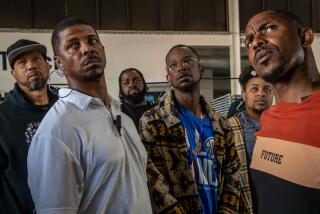Somebody’s gotta do it, and it’s him
It’s a dirty job, but Mike Rowe wants to do it.
Rowe, host of the Discovery Channel’s “Dirty Jobs” show, tags along with workers in the grittiest of trades, from sewer inspector to lobsterman, trying them out on camera. In an age when for many, “labor” means staring at a computer in a cubicle, Rowe’s job is to spotlight work that is grueling, often dangerous and always dirty.
The onetime wannabe actor has showcased more than 160 people who work with their hands and become one of Discovery’s biggest stars. Rowe sees himself as an advocate for a kind of job and class of worker that usually elicit more disgust than respect.
“Technology has created an entirely new type of job, and Silicon Valley has glorified these jobs,” he said. “But dirty jobs haven’t vanished, which is why I’m always happy to talk to these guys.” (And they still are usually guys).
It’s a twist of fate for Rowe, who claims that he got into show business to escape just the kind of scut work to which he now willingly subjects himself. Growing up in Baltimore, he often watched his father, a schoolteacher, and his grandfather, a skilled tradesman, repair their own cars and fix the plumbing. But, unlike them, Rowe wasn’t gifted with his hands.
So he decided to become -- what else? -- an actor.
“It’s not that I was looking for fame. I was trying to get away from embarrassment,” he said. “I couldn’t do the things they could do.”
Hoping to join the Screen Actors Guild, he became a member of its sister union, the American Guild of Musical Artists, by auditioning for the Baltimore Opera. Until then, Rowe’s musical background had been limited to singing in a barbershop quartet and performing at weddings. To his surprise, he won the role -- as a member of the background repertory playing pirates and Vikings.
But the bohemian artist’s life got tiring.
“A pirate needs riches. I had none,” Rowe said of the job that paid him about $10,000 a year.
During intermission one day, he ran into a friend at the bar across the street from the opera house. His buddy was auditioning for an on-air job at QVC. He bet Rowe $100 that he couldn’t get hired at the shopping network. Rowe passed the audition, ditched opera, and was soon earning $50,000 a year hawking jewelry and lava lamps on the air.
Then came another job that didn’t require scuffing his fingernails: host of American Airlines’ in-flight TV magazine program. The perks included free travel on the airline anywhere in the world. That was followed by a series of host gigs, including “Romantic Escapes” on the Learning Channel, “New York Expeditions” for PBS and “Egypt Week Live!” on Discovery, where he explored ancient tombs.
But it wasn’t until Rowe landed at KPIX-TV Channel 5 in San Francisco in 2001 as host of the local “Evening Magazine” show that he traded glamour for grime. Kicking around ideas that might intrigue audiences, he and a friend came up with “Somebody’s Gotta Do It.”
The idea turned into segments on “Evening Magazine” that showed people doing “underappreciated” jobs. Think cow inseminator, male cheerleader, mannequin assembler.
Later, Rowe pitched the same idea to networks such as CBS and Comedy Central, but they didn’t bite. Finally, the Discovery Channel commissioned it, producing three one-hour specials that aired in 2003 and eventually turned into the series “Dirty Jobs.”
Les Swanson, who scraped septic tanks, was one of the first people featured on “Dirty Jobs.” Rowe accompanied him underground on a hot summer day and helped him at the chore.
Swanson thinks of Rowe as a TV version of Studs Terkel, the author and oral historian whose 1974 book “Working” chronicled people talking about their jobs.
“He does a good job of showing how some people have to earn a living,” Swanson said.
On the show, Rowe has made charcoal, tanned leather, dug underground tunnels, bred bugs, exterminated rats, raised goats, cleaned fuel tanks and painted airport runways, among other things.
Rowe says 90% of the “Dirty Job” ideas come from viewers and fans. Along the way, he got sick on camera while grinding mackerel in choppy seas, was kicked by an ostrich and had his contacts fused to his eyes by a blast furnace.
“I’ve embraced the very thing I spent my life coming from,” he said.
Now in its third season, “Dirty Jobs” is one of Discovery’s top-three-rated shows, drawing an average of 1.9 million viewers per episode. Regular advertisers include Ford Motor Co., Dunkin’ Donuts and Nationwide Financial. Discovery owns the show, but Rowe retains licensing rights for T-shirts and other gear with his name. He declined to discuss his current salary.
“We live in a world where we spend the majority of our time in cubicles,” said Jeff Hasler, senior vice president of production and development at Discovery. “There’s a certain heroism for people willing to do the jobs that keep our culture and society running.”
There is a limit to how dirty even Discovery is willing to get, however. Rowe said he wanted to follow a “body farmer,” or someone who observes how corpses decompose in various environments -- such as a swamp -- which is knowledge that can be applied to police work. But the network wasn’t keen to show a decomposed body on the air, he said.
Unlike the rest of us, Rowe said, people with dirty jobs earn a benefit many people tapping keyboards long for: closure at the end of the workday. They can look back at their completed task, whether it’s a fish caught or a tunnel dug, with satisfaction.
“People with dirty jobs seem to be more balanced,” Rowe said, “and by and large happier than the rest of us.”
--
--
(BEGIN TEXT OF INFOBOX)
Sultan of sweat
Who: Mike Rowe
Age: 45
Education: Bachelor’s degree in communications from Towson University near Baltimore
Favorite dirty job: Gandy dancer, maintaining railroad tracks
Favorite city visited: Sydney, Australia
Personal: Single, lives in San Francisco, although because of shooting he spends only about six days a month there
Fun fact: Rowe has narrated 1,000-plus hours of television
More to Read
Sign up for The Wild
We’ll help you find the best places to hike, bike and run, as well as the perfect silent spots for meditation and yoga.
You may occasionally receive promotional content from the Los Angeles Times.







